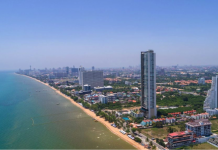Japanese car maker to expand further in Thailand
Despite the doom and gloom picture being painted by some employers groups concerning the rise in the minimum wage, Japanese car giant Nissan is set to grow its business by a substantial degree in the kingdom.
Nissan was the first Japanese car manufacturer to set up shop in Thailand, and its executive vice-president Hiroto Saikawa has confirmed plans to build a new factory at a cost of around 11 billion baht.
It will be constructed next to the current factory site at Samut Prakan and cover approximately 150 rai.
Nissan has said it wants to capture a 15 percent share of the Thai domestic vehicle market by 2016 and it hopes to achieve sales of 500,000 units into the ASEAN region by this same year.
The existing plant already builds and exports motor vehicles to 97 countries. The new plant is expected to be operational by August 2014 and will see the creation of up to 2,000 new jobs.
The new factory will initially have an annual production of 75,000 units but this will double within a few years according to Mr Saikawa.
The new factory will concentrate on the manufacturing of pickup trucks. The current factory no longer produces pickups as this segment of the business was moved to the Mitsubishi Motors plant in the Laem Chabang economic zone on the eastern seaboard just 20 minutes or so drive north of Pattaya.
All this expansion means that Nissan will be producing up to 700,000 vehicles a year, or more than 1,900 new vehicles rolling off the production line every single day, for the ASEAN region alone.
Presently, 60,000 Navara pickups are built at the Mitsubishi Laem Chabang factory and the new plant is not expected to be given this task, at least not in the short term.
Nissan currently manufacture seven models into the Thai market including the top-end Teana, as well as the Almera, March, Navara, X-Trail and the unusually-named Sylphy and Tiida.
Mr Saikawa said Nissan was committed to Thailand and supported the ‘Thai government’s commitment to investment, jobs, innovation, value and efficiency in the automotive industry.’
Nissan Japan controls 75 percent of the Thai operation, with the remaining quarter held by the Siam Motors Group.
Thailand’s geographic position has always been one of its major advantages in relation to most of its ASEAN neighbours and the Nissan management confirmed it views its plant in the kingdom as an important strategic manufacturing operation for the carmaker both regionally and globally.










